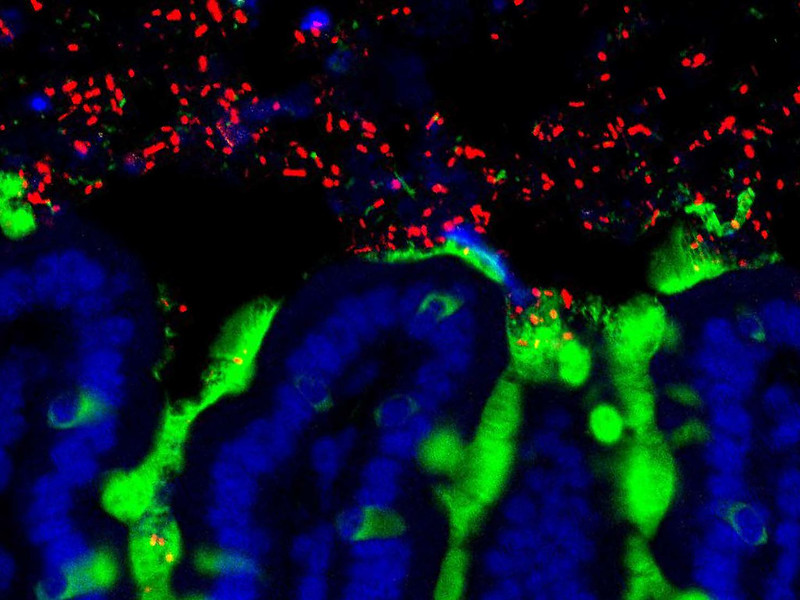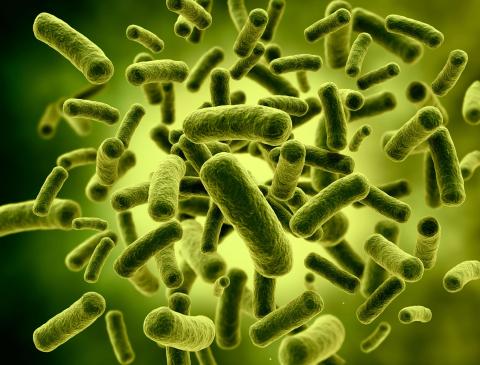Microbiota of pregnant mice influences the stem cells of their offspring
Research in mice shows that the gut microbiota of pregnant mice influences the development of stem cells in their offspring. Changes in the bacterium Akkermansia muciniphila in the maternal microbiota alter the proliferation of intestinal and neural cells in the offspring, according to the study published in Cell Stem Cell.
Mercedes Gómez - microbioma ratonas células madre EN
Mercedes Gómez de Agüero
Junior Group Leader at the Institute of Systems Immunology and member of Max Planck Research Group at The University of Würzburg (Germany)
The authors of the manuscript ‘Maternal microbiota influence stem cell function in offspring’, led by Prof Parag Kundu, have investigated how the development of major organs of the body, such as the intestine and the brain, is modulated. As our and other previous studies have already highlighted, the maternal microbiota has a major influence on host development, improving both intestinal and brain barrier function in early life. Unlike previous studies that compared the offspring of germ-free or gestationally colonised pregnant mice, this study used a more translational experimental design. Dr. Dang and colleagues administered a well-known probiotic, Akkermansia muciniphila (Am), to pregnant mice. This probiotic, Am, induces a major change in the maternal microbiota, promoting the expansion of bacteria that produce microbial metabolites, such as short-chain fatty acids, which are known to improve the development and function of intestinal and brain cells. This altered microbiota acts on embryonic intestinal and hhippocampal stem cells, which exhibit unique properties and facilitate tissue physiology in steady state or during inflammatory challenges.
This study joins previous research on this topic, confirming the critical relevance of maternal microbiota in the offspring’s development. They have highlighted how changes in the maternal microbial composition have a major impact on the development of critical organs of the body, including the intestine and the brain. Importantly, they show that altered maternal microbiota also determine intestinal disease susceptibility and behavioural traits throughout the lifespan. This study encourages further research to determine the favourable maternal microbiota for an optimal foetal development. Similarly to the recent publication of Dr. Ganal-Vonarburg and Prof. Vergères in which they administered prebiotics producers of targeted microbial metabolites to pregnant mice to promote intestinal immune development, this study highlights the necessity for further investigation into the mechanisms by which and the timing of maternal microbial interventions that could be employed as therapeutic approaches for healthy newborns and adults.
Rosa del Campo - microbiota ratonas células madre EN
Rosa del Campo
Researcher at the Ramón y Cajal Hospital and member of the Specialised Group for the Study of the Human Microbiota of the Spanish Society of Infectious Diseases and Clinical Microbiology (SEIMC-GEMBIOTA)
This paper attempts to demonstrate whether the maternal microbiome conditions neural maturation and gut differentiation by exposure of the foetus to bacterial metabolites before birth. It is a very solid work with few methodological limitations, using many animals and many complementary experiments.
The authors chose Akkermansia muciniphila as a healthy bacterium, and they make sure to make groups of mothers colonised or not by this bacterium. They also measure the metabolites that are exclusively produced by the bacteria, the short-chain fatty acids, and find that the group of mothers colonised by A. muciniphila have higher values. They also detect higher concentrations of amino acids necessary for neuron differentiation. In addition, the gut microbiome of mice born to A. muciniphila-colonised dams is richer and more diverse, which is associated with better gut health. In cell culture, the increased availability of metabolites helps differentiate nerve cells, and to complement the study they have blocked the mTOR pathway that is critical for cell differentiation.
The novelty of this work is that it demonstrates with very solid data that the intestinal microbiota of the mother conditions the maturation of the nervous system and the intestine of foetuses, even before birth, and the effect lasts up to 10 months postnatal. Thus, improving the gut microbiome of mothers, especially with probiotic supplementation and a healthy diet will also improve the health of the child. This is a very solid article. As always, there is a question as to whether [these results in mice] will be reproduced in humans, but there have been indications on this topic for some time.
Haiyue Dang et al.
- Research article
- Peer reviewed
- Experimental study
- Animals



